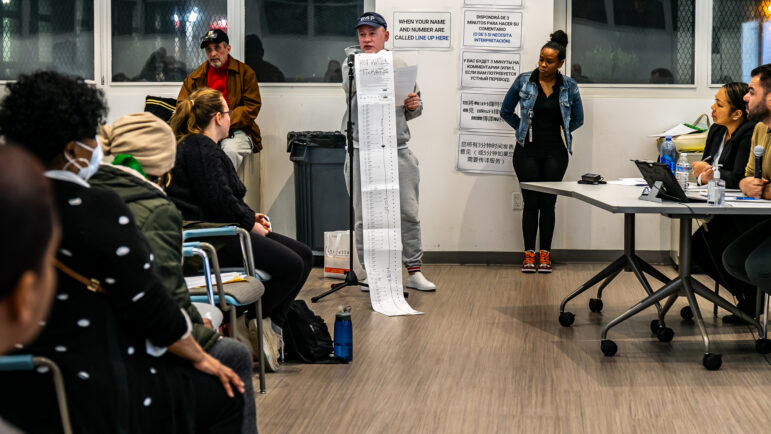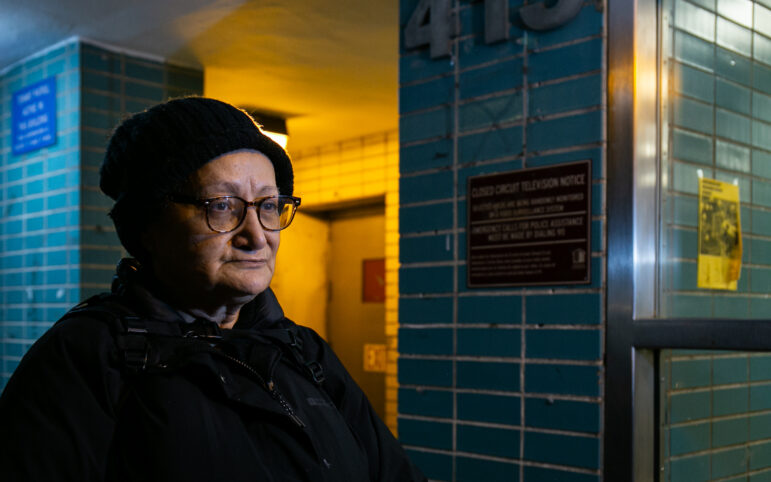NYCHA residents at the Fulton and Elliott-Chelsea complexes gathered Thursday for the first of three public meetings to discuss the potential environmental impacts of demolition.

Adi Talwar
Tenants gathered at the Hudson Guild Fulton Senior Center on Feb. 1 for the first of three Environmental Review meetings. Ramiro Morales displayed his hot water complaints.The community room was buzzing with side conversations and occasional outbursts, but when Ramiro Morales took the microphone, he had everyone’s attention.
Morales posed a question to the attendees sitting inside the Hudson Guild Fulton Senior Center: How would you respond if you had my problems? He then took folded papers from under his arm and let them roll onto the floor, resembling a scroll. They were a collection of 11 months’ worth of work orders or “tickets” for lack of hot water that he had submitted to the New York City Housing Authority.
“Would you accept these living conditions?” he asked the crowd.
Morales was the 20th speaker to share his thoughts Thursday evening at a meeting for the Chelsea Redevelopment Project, a controversial plan to remodel the current Fulton and Elliott-Chelsea Houses by way of demolition and reconstruction.
Under the plan, most tenants would remain in their apartments while new towers are constructed, and the old towers would be demolished once residents moved over.
A supporter of the proposal, Morales was joined by other NYCHA tenants, residents from the surrounding neighborhood, and representatives from local organizations who spoke out about how it could impact them in either a positive or negative way.
Spearheaded by NYCHA and the Department of Housing and Preservation Development (HPD), the meeting was the first of three discussions centered around the project’s Environmental Impact Statement (EIS), part of the City Environmental Quality Review process that explores the potential impacts of proposed development projects.
In 2023, residents were asked to participate in a survey asking whether they would prefer to see reconstruction in their existing buildings or start from scratch with the construction of new towers.
NYCHA announced last June that a majority of participating residents had voted for the latter. The decision made way for Essence Development and Related Companies to launch the redevelopment process.

Adi Talwar
A full house at the Hudson Guild Fulton Senior Center on Feb. 1.But there are several procedural steps to go. In addition to the EIS, an application must be sent to the U.S. Department of Housing and Urban Development (HUD) for the disposition of public housing under Section 18, which gives public housing authorities the right to demolish properties.
The four developments, which NYCHA says are in need of more than $900 million in repairs over the next 20 years, would then formally opt into the Rental Assistance Demonstration (RAD) program, which converts traditional public housing units and matches them with federal Section 8 vouchers.
Ultimately, NYCHA’s Chelsea apartments would join more than 37,000 units that are currently part of New York City’s Permanent Affordability Commitment Together (PACT) portfolio—PACT is RAD’s local iteration—but would be the first to see a tear-down.
All 2,056 apartments would be replaced, alongside 3,450 new mixed-income units and new stores, including a proposed supermarket.
One resident, Mary Jones, took to the podium to express her favor for these plans.
“I approve of the demolition, I think it’s the best thing for us,” she said to the full room. “I want my new apartment, I want to see a new nursery, I want my washing machine and dryer, I want my dishwasher….”
But her comment was interrupted by a mix of cheering and booing.
A few tenants zeroed in on environmental concerns. For example, Jackie Lara, a vocal critic of demolition, warned about debris. “When the debris starts coming down, nobody is going to be able to breathe there,” she said.
The construction process could also create traffic blockages, added tenant Celines Miranda. “These avenues are frequently used by emergency vehicles such as ambulances and fire trucks, we cannot cause any more blockage than we already have,” she said.
But more speakers focused on their roots at the complex, and their apprehensions about dramatic change.
Delores McClain, who has lived at the Fulton Houses for 18 years, said that although she has some lingering questions about the logistics of the redevelopment plan, it is something she is “possibly” open to.
“For me having a son with cerebral palsy, I would like to see a lot of changes,” McClain told City Limits. “We’re really concerned about whether this can be promising, positive, healthy, affordable and meet the needs of people who are disabled like my son.”

Adi Talwar
Alexa Cruz in front of Chelsea Houses where she has resided for over 50 years.Alexa Cruz, who has lived in the Chelsea Houses since 1969, told City Limits that she makes an effort to attend every meeting, but that they make her feel overwhelmed—this meeting was no exception.
“I’m not very happy about what’s going on,” Cruz said. “Housing was given to us back then… for the low income people, we weren’t accepted and now they want to take it away.”
At the conclusion of the meeting, Morales showed City Limits his list of tickets.
“The last time I didn’t have hot water was January 28,” Morales said. His list goes as far back as Feb. 18, 2023.
“I’m with the rebuilding,” Morales said. “I think it’s time… there’s nothing being fixed.”
A virtual environmental review session will be held on Feb. 5 at 4 p.m., followed by an in-person session at the Elliott-Chelsea Houses on Feb. 7 at 6:30 p.m. The public can submit comments until March 8.
To reach the reporter behind this story, contact Tatyana@citylimits.org. To reach the editor, contact Emma@citylimits.org.








